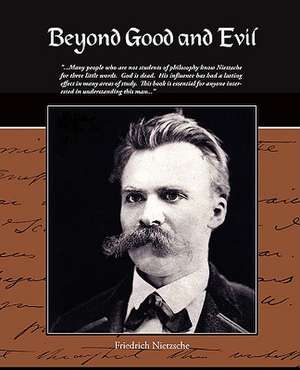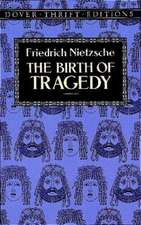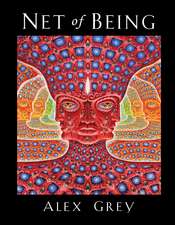Beyond Good and Evil
Autor Friedrich Nietzscheen Limba Engleză Paperback – 16 feb 2009
Preț: 130.45 lei
Nou
Puncte Express: 196
Preț estimativ în valută:
24.96€ • 26.13$ • 20.65£
24.96€ • 26.13$ • 20.65£
Carte tipărită la comandă
Livrare economică 08-22 aprilie
Preluare comenzi: 021 569.72.76
Specificații
ISBN-13: 9781438512310
ISBN-10: 1438512317
Pagini: 168
Dimensiuni: 191 x 235 x 9 mm
Greutate: 0.3 kg
Editura: Book Jungle
Locul publicării:United States
ISBN-10: 1438512317
Pagini: 168
Dimensiuni: 191 x 235 x 9 mm
Greutate: 0.3 kg
Editura: Book Jungle
Locul publicării:United States
Notă biografică
German philosopher and renowned scholar Friedrich Nietzsche was born on 15 October 1944, in Rocken, Prussia- Germany. His father was Carl Ludwig Nietzsche and mother Franziska Nietzsche. His father was a Lutheran preacher, who died when Nietzsche was only four-years old. After his father's death Nietzsche family shifted to Naumburg, he studied in a preparatory school and after that he joined prestigious Schulpforts School. He studied in University of Bonn and Leipzig, he was interested in philology, literature, linguistics and history. He did job as a professor of classical philology at the University of Basel in Switzerland. His first book' The Birth of Tragedy' was published in 1872 and 'Human, All Too Human' in 1878. Nietzsche believed in realities of life, he glorified the individuals and culture. He openly challenged the basics of Christianity and conventional ethics. He is famous for his thought 'God is dead'. At the early age of 55 years, on 25 August 1900 Nietzsche died. His popular works - Thus Spoke Zarathustra, Beyond Good and Evil, The Anti - Christ, On the Genealogy of Morals, The Gay Science, The Birth of Tragedy etc.
Descriere
Descriere de la o altă ediție sau format:
`What is done out of love always takes place beyond good and evil.' Always provocative, the Friedrich Nietzsche of Beyond Good and Evil (1886) is at once sceptical psychologist and philosopher-seer, passionately unmasking European society with his piercing insights and uncanny prescience. This masterpiece of his maturity considers quintessential Nietzschean topics such as the origins and nature of Judeo-Christian morality; the end of philosophical dogmatism and beginning of perspectivism; the questionable virtues of science and scholarship; liberal democracy, nationalism, and women's emancipation. Written in his most masterful style, full of irreverence and brio, Nietzsche dissects self-deluding human behaviour, bankrupt intellectual traditions, and the symptoms of social decadence, while at the same time advancing an extra-moral wisdom to be shared by those kindred soul who think 'beyond good and evil'. This new translation of Beyond Good and Evil provides readers with a true classic of modernity that sums up those forces and counterforces in nineteenth-century Western Civilisation that to an astonishing degree have also determined and continue to inform the course of our own century. ABOUT THE SERIES: For over 100 years Oxford World's Classics has made available the widest range of literature from around the globe. Each affordable volume reflects Oxford's commitment to scholarship, providing the most accurate text plus a wealth of other valuable features, including expert introductions by leading authorities, helpful notes to clarify the text, up-to-date bibliographies for further study, and much more.
`What is done out of love always takes place beyond good and evil.' Always provocative, the Friedrich Nietzsche of Beyond Good and Evil (1886) is at once sceptical psychologist and philosopher-seer, passionately unmasking European society with his piercing insights and uncanny prescience. This masterpiece of his maturity considers quintessential Nietzschean topics such as the origins and nature of Judeo-Christian morality; the end of philosophical dogmatism and beginning of perspectivism; the questionable virtues of science and scholarship; liberal democracy, nationalism, and women's emancipation. Written in his most masterful style, full of irreverence and brio, Nietzsche dissects self-deluding human behaviour, bankrupt intellectual traditions, and the symptoms of social decadence, while at the same time advancing an extra-moral wisdom to be shared by those kindred soul who think 'beyond good and evil'. This new translation of Beyond Good and Evil provides readers with a true classic of modernity that sums up those forces and counterforces in nineteenth-century Western Civilisation that to an astonishing degree have also determined and continue to inform the course of our own century. ABOUT THE SERIES: For over 100 years Oxford World's Classics has made available the widest range of literature from around the globe. Each affordable volume reflects Oxford's commitment to scholarship, providing the most accurate text plus a wealth of other valuable features, including expert introductions by leading authorities, helpful notes to clarify the text, up-to-date bibliographies for further study, and much more.
Cuprins
Beyond Good and Evil Introduction
Further Reading
Translator's Note
Further Reading
Translator's Note
BEYOND GOOD AND EVIL
Preface
Part One: On the Prejudices of Philosophers
Part Two: The Free Spirit
Part Three: The Religious Nature
Part Four: Maxims and Interludes
Part Five: On the Natural History of Morals
Part Six: We Scholars
Part Seven: Our Virtues
Part Eight: People and Fatherlands
Part Nine: What Is Noble?
From High Mountains: Epode
Commentary
Chronology



























